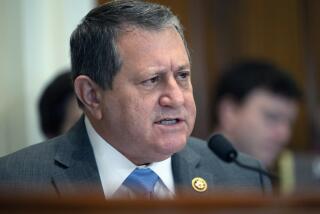Clinton Opposes Ban on Flag Desecration
- Share via
WASHINGTON — The Clinton Administration, picking a fight over an issue ripe with patriotic symbolism, on Tuesday announced the President’s opposition to a constitutional amendment prohibiting desecration of the American flag.
In the Administration’s first public comments on the proposed amendment, Assistant Atty. Gen. Walter Dellinger warned that such a measure, which is expected to be taken up by both the House and Senate in coming weeks, would “create legislative power of uncertain dimension to override the First Amendment and other constitutional guarantees.”
Congress, Dellinger told a Senate Judiciary Committee hearing on the issue, should resist the temptation to conduct “a first-time edit of the Bill of Rights in the absence of any meaningful evidence that the flag is in danger of losing its symbolic value.”
A leader of the American Legion, which is pressing for the so-called flag-burning amendment, professed disappointment and confusion at what he suggested is a reversal by Clinton. William Detweiler, national commander of the American Legion, said that an early meeting of leaders of veterans’ groups with then-Gov. Bill Clinton had left all involved “firmly convinced” that Clinton would support a constitutional amendment on flag desecration. Now, he added, he would seek a meeting with Clinton to convince him to get behind the measure.
A House subcommittee already has drafted its version of the constitutional amendment. After expected approval by the full Judiciary Committee today, the House is slated to act on the measure on Flag Day, June 14. Advocates of the amendment have gathered commitments in the House just short of the 290 votes needed for passage.
But while Clinton’s voice is certain to be an important one in the debate, the President has no direct power to thwart the measure. If passed by two-thirds majorities in the House and Senate, the proposed amendment--the third Congress has considered this year--would go directly to the states for ratification. Thirty-eight states must approve an amendment before it becomes part of the Constitution.
With roughly 80% of Americans declaring their support for a flag desecration amendment, Clinton’s opposition to the measure is equally certain to be controversial. The Administration’s decision to declare the President’s position on the politically sensitive issue came only after the Senate Judiciary Committee sought an Administration witness to testify before it. White House spokeswoman Ginny Terzano said that “we willingly complied” with the Senate’s request.
“The President believes that while we should object in the strongest of terms to desecrating the flag, we should not be tinkering with the Bill of Rights,” she said.
Senate Judiciary Chairman Orrin G. Hatch (R-Utah) disagreed with Dellinger’s contention that an amendment is so broadly written it could jeopardize constitutional rights. “We can withdraw this one unique object from physical desecration and our freedom of speech will remain intact,” Hatch said. He said that freedom of speech has never been absolute, citing libel and obscenity laws.
Sen. Edward M. Kennedy (D-Mass.), an opponent of the amendment, called the measure “a troubling and unprecedented effort to politicize the Constitution.” That document, Kennedy added, “should not be treated as a billboard on which to plaster the bumper-sticker slogan of the moment.”
Times staff writer Doyle McManus contributed to this story.
More to Read
Get the L.A. Times Politics newsletter
Deeply reported insights into legislation, politics and policy from Sacramento, Washington and beyond. In your inbox twice per week.
You may occasionally receive promotional content from the Los Angeles Times.











